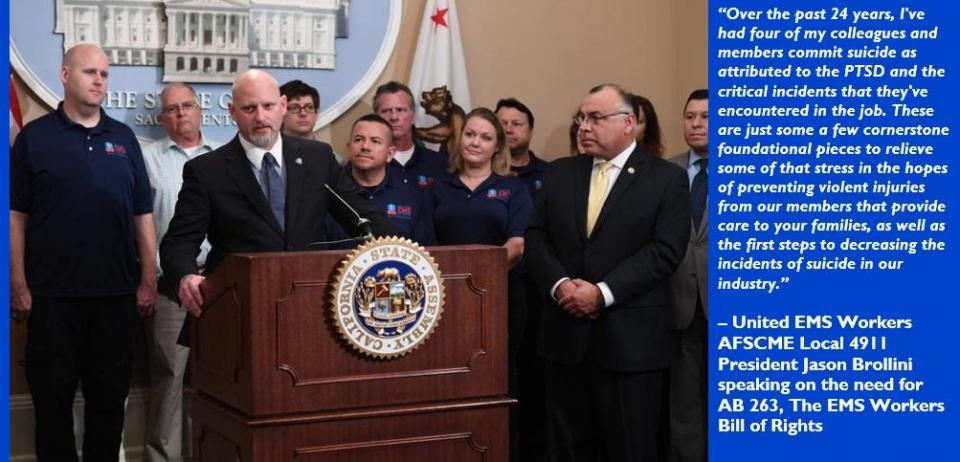
Protecting Workers’ Rights and Patient Care
Worker protections and patient care ultimately go hand-in-hand. Our members work tirelessly to deliver high quality services despite the many obstacles presented in their respective lines of work. This year, AFSCME highlighted the extraordinary challenges that our United EMS Workers face everyday while providing life-saving care. AFSCME members in this profession faced a serious lack of worker protections which compromised their ability to enjoy dignity on the job. Thanks to the efforts of Assemblymember Freddie Rodriguez (author of AB 263, the EMS Workers Bill of Rights) commonsense worker protection policies were heard in the California State Legislature to help our members receive the basic rights and protections they deserve.
Our EMS members are committed to providing quality emergency prehospital care when county citizens call 911. California’s emergency medical services are a primary point of medical care and are increasingly relied upon to stabilize and provide urgent medical care on scene. Disappointingly, the subpar working conditions in which these private sector first responders operate often undermines their own safety and ability to provide the highest quality of public service. Most paramedics and EMTs in the private sector work 12 to 24 hour shifts, often going without adequate meal or rest breaks. High stress levels in these high pressure environments lead to unsafe conditions, compromising medical care and safety of personnel, patients and the public. As a result, EMS personnel often see high rates of injuries on-the-job, impaired mental and physical health, shortened careers and burnout.
In response to these significant concerns, AFSCME California, United EMS Workers Local 4911 and Assemblymember Freddie Rodriguez introduced AB 263. This bill requires contracted private sector EMS employers to provide adequate rest and meal breaks to service providers, thereby reducing some of the chronic stresses that have been shown to lead to the poor mental health conditions of EMS professionals. Addressing these issues will lower costs by reducing the rate of injuries, collisions, illnesses and absenteeism. These changes will likely reduce the rates of PTSD, depression and burnout our members in this profession face. The bill makes simple but needed changes to improve the lives and working conditions of EMS workers across our state. Although AB 263 is currently in the Senate Rules Committee and did not move forward this year, it created an important dialogue for our elected leaders to better understand the constant issues our members face.


